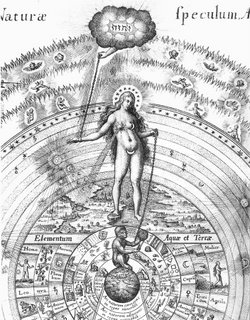
Robert Babe coined a phrase that LI is going to steal: infinite earth. My plan for this year’s posts is to sorta weave a pattern around the idea of anima mundi. The anima mundi idea emerges, in the early modern era, as the twin of infinity. Not of course that the anima mundi idea is new, since of course it occurs in one form or another as far back as we care to go. But something happens in the modern era, or rather a whole bunch of seemingly disconnected things happen. To quote again from Bruno’s Ash Wednesday’s colloquy:
“And he [Bruno] opened their eyes to see this deity this mother of ours, [earth]which on her back feeds them and nourishes them after she has produced them from her bosom into which she always gathers them again -- who is not to be considered a body without soul and life, let alone the trash of all bodily substances. In this way we know that, if we were on the moon or on other stars, we would not be in a place much unlike this, and perhaps on an even worse [place], just as there may be other bodies as good and even better for their own sakes and for the happiness of their own animals [inhabitants]. Thus we know as many planets, as many stars, as many deities, which are those hundreds of thousands that assist in the service and contemplation of the first, universal and eternal efficient [cause]. … We know that there is but one heaven, an eternal, immense region, where these magnificent lights keep their proper distances for a commodious sharing in a perpetual life. These blazing bodies are those ambassadors that announce the excellence of God's glory and majesty. Thus we shall advance to the discovery of the infinite effect of the infinite cause, the true and living evidence of the infinite vigor.”
Babe’s infinite earth phrase is found in his book, Culture of Ecology, and makes references to the usual arguments of the ecological economists, like Robert Goodland, whose The Case that the World has Reached Limits in 1991 is a little touchstone in the ecological economics movement. The usual arguments that are made back, by orthodox economists, are rather sweet. Poor people, who are basically flushed down the toilet by orthodox economists and certainly aren’t mingled with in their circles, unlike, say, bankers and CFOs, are suddenly hauled out of the toilet and marched front and center – economics, it turns out, is all for the poor. This critique of ecologism by Jay Mandle in the Boston Review is pretty much standard. When the ecological economist claims that economic activity unfairly enriches a grossly wealthy upper class, the Mandle’s of the world ignore pesky statistics about the distribution of wealth and go towards wealth effects, like the increase in life span, among the population as a whole. That is a useful statistic, but it is, of course, not a knock down argument: one can glance into any old folks’ home in these States and see increasing life span without an increase in the joy in life, so to speak. It certainly doesn’t address the issue, which is that transfers of wealth from the wealthiest would not decrease the wealth effect on the majority of the population, while at the same time taking out one of the drivers of growth that does the most ecological damage.
But this post – and in general the battle royale I am planning on staging between the Infinite Earth and Anima Mundi – is just going to graze these issues. I am more interested – in fact, passionately interested – in fact, head over pores immersed in, emotionally wired to, suicidally fixated on – the culture itself that is part and parcel of the infinite earth.



No comments:
Post a Comment